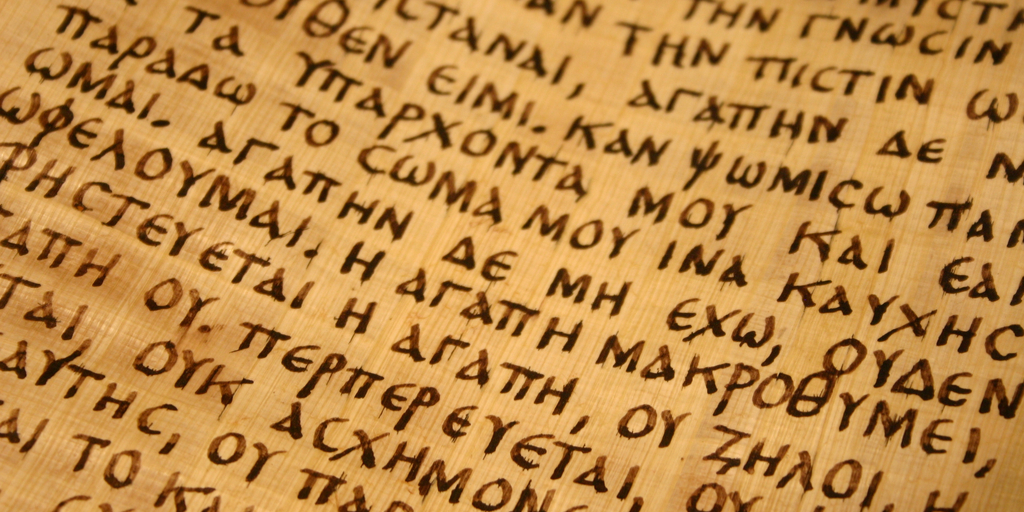Opening Up Things With God

The book of Acts describes several instances of things that God opened up. In this study we will briefly consider eight verses in the New Testament about these things. The English verb “to open” (Gr. anoÃgÅ) occurs quite often: 77 or 7 x 11 times, whereas the associated noun (Gr. ánoixis) is found only once (Eph. 6:19). The Greek compound verb (dianoÃgÅ) has the preposition “dia” as a prefix and this verb is used in seven different forms, found eight times in total in the New Testament. It means a thorough or complete opening up. May this happen to us, while studying and contemplating God's Word, that the Lord may open it up and that, as a result, our hearts may open wider to Him! It is interesting to note that seven of these eight occurrences are found in Luke’s writings, but the first one is in Mark.
(1) The Opening of the Ears
“And they bring to Him a deaf man who could not speak right, and they beseech Him that He might lay His hand on him. And having taken him away from the crowd apart, He put His fingers to his ears; and having spit, He touched his tongue; and looking up to heaven He groaned, and says to him, Ephphatha, that is, Be opened. And immediately his ears were opened, and the band of his tongue was loosed and he spoke right” (Mk. 7:32-35). “Be opened” (v.34) represents one of the seven forms in which the verb dianoÃgÅ occurs. How fitting it is that this should be the first occurrence in the series of eight! At this point, an application can be made to all Christians: before we were saved we were sinners and enemies of God, not able to hear God's voice. In the incident just quoted, we may observe the actions that were needed to enable us to listen to His voice.
- First, the Lord had to come down. This tremendous stoop is described in Philippians 2:5-8 and 2 Corinthians 8:9; without this stoop we would be lost, forever.
- Then the Lord identified with the deaf man – a lost sinner – by putting His hand upon him. Thus, Christ identified with us in our need (and similarly, the Lord will identify with the Jewish remnant in days to come). By the grace of God, all those who are saved can say, “The Lord put His hand on me.” But for Him this meant, ultimately, the death of the cross! On our side, through faith, we identify with His cross, as Paul learned to do (Gal. 2:20).
- “He took him aside from the multitude.” The Lord acted this way because of His public rejection by the nation of Israel. Today, the Lord (now acting from heaven) separates believers from the religious world.
- Mark emphasized the Lord's skillfulness as He put His fingers into the deaf man's ears, in view of his healing. This was part of the healing process: the touch of the Master's hand! It seemed to make the situation even worse, but it illustrates how intensely the Lord identified with the man's problem. When we have a problem or are troubled in any way, let us go to Christ so that He may take charge. However, we first need to surrender to Him and allow Him to take full control.
- Then He spat. We might think that this was somewhat inappropriate, but it was needed. This action expressed that Christ, from His inner being, shared something of Himself with this man.
- Furthermore, He touched the deaf man's tongue. This demonstrates Christ's ability to bring about healing, the skilfulness of His hand.
- He was “looking up to heaven.” In Mark's Gospel, the Lord is portrayed as the dependent, humble Servant. His resources came from God, and He publicly acknowledged that.
- “He sighed.” This may have been reported to show how impressed our Lord was by the seriousness of the problem. We sigh1 when we are faced with severe problems, but then we too, may look up to heaven for the resources that come from God.
- And He says, “Ephphatha” (the Aramaic word for “Be opened”). The ears need to be opened first, before other blessings can come. Romans 10:17 teaches that faith comes through hearing the Word of God (vv.8-21). An application: if you cannot hear yet, spiritually, it means that you are still lost. You need to listen first, for God to work further in your life.
The passage from Mark's Gospel that we just examined is the first of eight references New Testament references using the particular verb, meaning, “to open up.” We may proceed to consider the seven occurrences of this verb found in Luke's writings.
(2) The Opening of the Womb
In Luke 2, the opening is related to the Lord's entering into this world and this forms quite a contrast to the situation of the deaf man who was unable to speak. Luke describes many details about Christ's coming into this world and although this one is also linked with this word “opening, ” the setting is quite different. “When the days were fulfilled for their purifying according to the Law of Moses, they brought Him to Jerusalem to present Him to the Lord (as it is written in the law of the Lord: Every male that opens the womb shall be called holy to the Lord)” (Lk. 2:22-23).
Here we meet the Lord Jesus in His perfect humanity, as a Baby. He came into this world, being born like every other child, yet there was a tremendous difference because the Lord was conceived of the Spirit as announced by the angel Gabriel. Thus, from the very beginning, Christ is unlike all others, for He is God, blessed over all, yet (indescribable mystery) Son of God and Son of Man! We cannot fathom these mysteries of His Person, nor grasp the greatness of His stoop in becoming a Man through the wonderful work of the Holy Spirit in Mary. Such is “the mystery of piety ” (cf. 1 Tim. 3:16): “The Word became flesh and tabernacled among us ” (Jn. 1:14).
The point that is highlighted here in Luke 2:23, is a quote from the Old Testament law, “Every male that openeth the womb shall be called holy to the Lord” (Ex. 13:2 KJV). At the time of Israel's exodus from Egypt, God established His rights as Redeemer: righteous claims that He wanted to be demonstrated in every firstborn baby boy. Therefore, when the Lord Jesus came into this world, Joseph and Mary, through their obedient action, acknowledged God's rights upon Christ as a man (perfect human being, in spirit, soul and body) and as One of God's earthly people. Every human being should submit to God's rights as Creator but our society does not and even we, as believers, do not always respect His claims. However, the principle of obedience and submission to God was maintained in the Baby Jesus. Every firstborn male child in Israel was to be set apart for God in recognition of His rights as Creator-Redeemer, and consecrated to Him and His service. Later in Exodus, this consecration was limited to the Levites but it remains a beautiful illustration for believers today. Furthermore, the Lord Jesus was not only born among His earthly people, but He also represented an entirely new generation, without sin, “sin apart.” The Lord did not have a human father as every one of us do, but He represents a new beginning as the Head of a new generation and Firstborn of a new order. Introducing this new order, He was set apart for God from the very start. Only on the basis of His death and resurrection, Christ has become the First-born among many brethren and so believers are introduced into this new family.
Application to the Believers
From the moment we were born again, God set us apart for Himself. In that sense we are holy, sanctified. We do not have to wait a number of years to become holy or be declared holy by someone. No; Christians are holy by the calling with which they have been called. Thus, set apart, we are here for Him and for His interests. Do we apply this to our daily circumstances? As long as we are in this world: are we really devoted to God’s interests? What a wonderful and perfect example we have in our Lord Jesus; what a challenge and encouragement can be found in Him!
(3) The Opening of the Eyes
Luke 1 and 2 provide details about the virgin Mary and about Him who came from her womb, whereas Luke 24 describes the virgin tomb. In this study, we consider the particular verb dianoÃgÅ, used to describe three things being opened in Luke 24. The tomb is opened first, though the verb is different (the stone rolled away), because the open and empty tomb is the basis for the following openings. In the apostles’ public discourses recorded in Acts, we regularly find a reference to Christ's resurrection, the foundation on which we stand: as Christians we stand on resurrection ground (1 Cor. 15). Then we read the special verb that we are studying, “Their eyes were opened, and they recognised Him. And He disappeared from them” (Lk. 24:31). Looking at the context, we notice that these two disciples of Emmaus were discouraged and probably even depressed. But the Lord came to their rescue. How often we need the Lord to come in to encourage us! How did He do that with the two disciples? First, He asked about their circumstances. He did not impose Himself on them and, in God's providence, they did not immediately recognize Him either even though they had been familiar with Him. Then, gradually, a change started to take place and they began to have confidence in Him, so that He could speak freely to them, “Ought not the Christ to have suffered these things and to enter into His glory? And having begun from Moses and from all the prophets, He interpreted to them in all the Scriptures the things concerning Himself” (vv.26-27).
This is the third reference in the series of eight about a complete and thorough opening. The Lord could not have started with this teaching without the foundation He laid through His accomplished work and resurrection. But now, He was able to come closer to them, while speaking of Himself. How did He do so? By quoting Moses' writings, the Prophets and all the Scriptures (the complete Old Testament), He opened them up, explaining the things concerning Himself! The two disciples must have perked up their ears as they started to see ... and so their hearts opened up for Him. This could be a subject in itself: are our hearts really opened to welcome the Lord Jesus, to truly embrace Him, as Simeon did (Lk. 2:28)?
Christ is the Key
It is important to understand that all the Scriptures speak of Christ. He is the Key. Without Him we cannot understand the writings of Moses. In the first chapter of Genesis we meet Him, the Creator: how great He is (cf. Jn. 1:1-2; Col. 1:16-17; Heb. 1:2-3)! In Exodus, Moses describes many details linked to Israel's redemption from Egypt, but when we understand that the Lord Jesus is the Key, we start to see that He is being portrayed in the Passover lamb (Ex. 12), in the bondservant of Exodus 21, and in so many of these passages. Using Himself as the Key, according to God's thoughts, the Lord was able to gain the attention of the two disciples, drawing them away from their problems and themselves, to the things concerning Himself. As a result, the two disciples' eyes were opened (v.31). Thus, while the Scriptures were being presented to them, there was a work of God going on in them (cf. Gal. 1:16). If there is anything that we really need, it is this: that our attention and our hearts be drawn to the Lord Jesus, to the things concerning Himself. This is how we should study the Scriptures. Then they become living, vibrant and real. When we take up the Scriptures in connection with our Lord Jesus Christ, our eyes, too, will be opened to see more of Him. Today there are orthodox Jews who know the Scriptures (the Old Testament) by heart. We may have a great respect for their knowledge but they still lack this opening of the eyes.
Saul of Tarsus was one of them but, once he had seen the Lord in glory, everything changed. He had learned the Scriptures by heart, but he did not know the One of whom they spoke! When he met Him, he understood the Key to the Old Testament record was right there (cf. Phil. 3:3-7; Heb. 2:9) and ... the Scriptures were unlocked to him. Although he knew them so thoroughly, outwardly, they had been like a closed book with a veil over them. However, Christ can and does take the veil away (2 Cor. 3 explains this in detail). That is, it may be suggested, what happened to the two disciples from Emmaus. When their eyes were opened “they knew Him” and recognized Him. At this point, a true relationship was established, because He stayed in their hearts, even though He vanished out of their sight. Is this true of us as well?
(4) The Scriptures Opened
The fourth occurrence of the verb dianoÃgÅ follows immediately and again, there is a direct link to the Scriptures. “And they said to one another, was not our heart burning in us as He spoke to us on the way, and as He opened the scriptures to us?” (v.32). We, too, in reading the Scriptures need the Lord's help to understand more of Him, especially in portions that are difficult to grasp. If we do not comprehend them, let us not give up but keep on reading because the Holy Spirit will gradually open them up and make them clear. This may remind us of Psalm 119, “The entrance (opening) of Thy words gives light, giving understanding unto the simple” (Ps. 119:130). By the way, the two disciples had opened their house for the Lord Jesus receiving Him into their home, having urged Him to come in (Lk. 24:29). This is another point to meditate on: by opening their house to Him, He came in as a Guest, but in due course He became the Host, the Master of the house, “Having taken the bread, He blessed, and having broken it, gave it to them” (v.30). Wonderful things happen when the Lord receives His rightful place in our homes. Does He really have this place in our homes and lives; is He “on the throne”?
(5) The Understanding Opened
There was a happy sequel to all of this, one that all the disciples enjoyed. “Then opened He their understanding, that they might understand the scriptures” (v.45). So our special word for opening is used for three matters in Luke 24:
- He opened their eyes, and they recognized Him;
- He opened the Scriptures; so they understood that the Scriptures speak of Him;
- He opened their understanding, so that they would be able to correctly apply the Scriptures in the way He had done this.
This is what we need as well. It is not sufficient to understand the Scriptures in a merely intellectual way. We need “a further touch” as we are in need of this opening of the understanding. We may connect this to that which John 6 describes about the matter of appropriation, because it is by eating that we make the things of God our own. This appropriating parallels the thought of opening the understanding in Luke 24. Through a process of eating and digesting we make the things concerning the Lord our own. There are two sides that go together again: we make the effort – we read the Scriptures, meditate on them, study and examine with the help of a concordance – while simultaneously a work of God takes place. Is it not striking to see how, at the same time that we take in His thoughts, God works together with us, helping us to make these things our own?
(6) The Heavens Opened
Luke's Gospel presents Christ as our Model on earth, but in Acts we find a company formed after the One who is now in heaven. In Acts 7, in Stephen, we meet the prototype of what a Christian is or should be: a witness-martyr. The Lord's testimony in this world is a suffering testimony, exemplified in Stephen, the overcomer. Just before he was stoned to death, he could say, “Behold, I see the heavens opened, and the Son of man standing at the right hand of God” (v. 56). Here we find that same verb again, “opened,” where it has the meaning of being thoroughly opened and being completely opened up. Comparing this with what is recorded in Matthew 3 about the Lord's baptism, we notice on that occasion that the heavens were opened upon the Lord, the Holy Spirit descending upon Him, to anoint Him in view of His coming public service. There on earth on the banks of the Jordan, He was the Object of heaven's delight, the heavens looking down on Him. But in Acts 7, it is the other way around: here there was a disciple on this earth while the heavens opened up for him, so that he could look up into Heaven, to see “the Son of man standing at the right hand of God.” The Lord Jesus, again, is the Object, not on earth, but in heaven! What we find in Acts 7:56 is a wonderful summary of the Epistle to the Hebrews, which speaks about the opened heavens and the Son of man at God’s right hand. In other words, before this Epistle was written, Stephen already enjoyed, in actual practice, the truth of Hebrews.
What about us? Do we appreciate the privileges that we have in an opened heaven with free access to come before the throne of grace (Heb. 4:16; 10:19)? We may, indeed, come freely and boldly with our requests, as well as with our praise and worship because we see “Jesus crowned with glory and honour” (2:9). In Acts 7, we read that the Lord was standing. This was possibly in order to sit down, because He had not long before entered heaven and had been welcomed by God (Heb. 5:10): the whole multitude of angels must have ascribed praise to Christ, entering the heavens. But He was going to sit down, as the Epistles teach. On the other hand, Luke may have emphasized that Christ was standing there because He was, as it were, still waiting for His people to change their mind so that He would be able to go back to them (this will, in fact, happen after their future national confession, Isa. 53). At any rate, at this time He is the Son of man sitting at Gods' right hand! Yet Stephen, just before his death, saw Him standing: to receive His faithful servant and introduce him into Paradise at his martyrdom. And so Christ Himself was standing, ready to come to Stephen's rescue. Looking up to Jesus in heaven as Stephen did, is our privilege as well, for we may contemplate the glory of the Lord and be transformed from glory to glory (2 Cor. 3:18).
(7) The Opening of Lydia’s Heart
“Now a certain woman named Lydia heard us. She was a seller of purple from the city of Thyatira, who worshiped God. The Lord opened her heart to heed the things spoken by Paul” (Acts 16:14). This is a great example of a work of God. This Gentile merchant lady had shown interest in the God of Israel, having joined those faithful Jews who on the Sabbath used to come together at the riverside to pray.2 That is where the Holy Spirit sent the apostle Paul and his company. While Paul was speaking, God opened Lydia’s heart. Luke, who was present at the time, under the inspiration of the Holy Spirit, recorded what happened. According to the original language of the area Lydia came from, her name means something that is grievous or painful. This represents man’s character and condition since Adam and Eve’s fall; even the delivery of a baby is a painful matter. In Lydia we have an indication of what and where every human being really is, sorrowful. But Lydia had an interest in God; the KJV says, she “worshipped God”; this indicates her great interest, at that moment, in the Jewish religion and the God of Israel, an interest that prepared her for what was going to follow, when God would come into her life and “take control.” She had an interest in God, but now He comes in to open her heart. From the heart “are the issues of life” (Prov. 4:23). The heart is the very centre of our being, our personality and therefore, when the heart is opened to God, we are off to a good start. Later in the same chapter, she opened her house for the gospel, then for Paul and his company (Silas, Timothy, Luke), and probably for the believers in Philippi also, some of whom had been saved that same week. It is possible that the new assembly even started to meet there. An open house, indeed, but it started with a heart that was opened, even as it had been with the two disciples from Emmaus.
(8) Paul’s Ministry – Opening up the Scriptures
Leaving Lydia's home, Paul travelled from Philippi to Thessalonica. There, for three Sabbaths, he spoke with the Jews in the synagogue. “Opening and setting before them that Christ must needs have suffered, and risen again from the dead; and that this Jesus, whom I preach unto you, is Christ” (Acts 17:3). What was Paul doing here? He was doing the same as the Lord did in Luke 24 with the disciples from Emmaus. Using the Scriptures, thoroughly opening them, Paul, a Jewish Christian, presented the Old Testament scriptures to his fellow Jews (not Christians yet) and proving to them Who the Christ is according to the Scriptures – the Messiah – and explaining to them that He had to suffer (the same “must” we find in Luke 24:26). “This Jesus, whom I preach is the Christ.”3 Paul had been in the school of God and had learned to follow his Master’s example! With respect to Paul's ministry, in Acts 26, Luke summarized the Lord’s instructions to Paul, using the same verb, “to open their eyes” (but without the prefix dia) as when Paul “opened up” the Scriptures. The Lord's commission to Saul from the glory, was “to open their eyes, and to turn them from darkness to light, and from the power of Satan unto God, that they may receive forgiveness of sins, and inheritance among them which are sanctified by faith that is in Me” (Acts 26:18). The Lord Jesus is once again, the supreme Object, as well as the Centre.
Faith links us with Him as He is now in the glory. In connection with this, the opening of the eyes is mentioned one more time (Acts 17:3), using the verb dianoÃgÅ. What a change: from darkness to light! The extreme moral darkness described, especially in relation to Corinth and Ephesus (Acts 18-19), is the background against which our exalted Lord comes in, in grace. This intervention coincides with the action of our God and Father, who delivered us from the power of darkness and from the power of Satan, to transfer us into the kingdom of the Son of His love (Col. 1:13)!
More Things Opened
The eight occurrences of the verb dianoÃgÅ “(thorough) opening” or “to open up (completely)” introduce a new order of things. What is the result of all these openings – of the eyes, of the understanding and of the Scriptures? In the days after the Lord’s resurrection, these openings were necessary so that He could lead the disciples out to Bethany and bless them (Lk. 24:50-53). This leading them out was not only on the occasion of His ascension; it was also needed in view of a response they might give in worship to Christ and to God. After our Lord’s ascension, the disciples returned to Jerusalem to the temple, but they no longer belonged to the Jewish religious system that had cast out their Messiah.4 They were there continually rejoicing, praising and blessing God, as a priestly company for God’s interests linked with the glorified Christ.
What a contrast with the beginning of Luke's Gospel, when Zacharias served inside the temple while the people stood outside! Then the entrance to God had been a closed one, even for the priest, while it was allowed that, only once a year, the high priest could enter God’s presence and only with the blood of a sacrifice. Now the entrance was open, wide open, and the disciples had obtained free access. Today, this access is the privilege of every true Christian. All these “openings” demonstrate that we have free access to God the Father and to our glorified Lord, and this is through the Holy Spirit. The heavens are opened, and we can enter in by faith, our mouths opened to praise and bless God. Often our mouths are shut because of our failures (even though our position in Christ is perfect). Here in Luke 24 they were open because the disciples were welling forth a good message concerning the King (Ps. 45:1), their risen and ascended Lord. From the abundance of the heart, the disciples' mouths could speak in praise and worship. This “outflow” was in response to the openings worked by the Lord. May the Lord help us to be more at His feet, to learn from Him as He opens up the Scriptures, so that we can also be true worshippers! In heaven, our hearts will be opened to all the treasures of God’s Word and we will be worshippers forever. What a prospect!
1: The verb Mark used (Gr. stenázÅ) is also translated as groan (Rom. 8:23; 2 Cor. 5:2, 4; Heb. 13:17) or grumble (Jam. 5:9); it occurs 6 times in the NT. back up
2: There was no synagogue at Philippi because there were not enough men. According to rabbinic rules, ten Jewish men were needed for a synagogue service. Since there were not enough Jewish men, the women would come together and sit down at the riverside for prayer, a custom familiar to Paul. back up
3: The verb “preach” or “proclaim” is identical to the one in Acts 17:18 and Philippians 1:18. back up
4: Though morally speaking it took almost forty years to wean them from Judaism. (See also Hebrews, written to help the Jewish believers move out of the old system and “unto Christ”). back up





